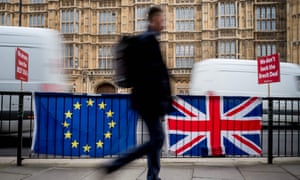The options are few and far between. This parliamentary compromise is potentially the only face-saver for the UK

In yet another attempt to hold her fractured cabinet together, the prime minister has now offered “meaningful votes”: on her deal, on no deal, and on a short extension to article 50. None of these has moved her basic position one iota. All this means is that if she does not get her way we will be in exactly the same position as now, but with the cliff edge at the end of June instead of March. Even worse, the possibility for a longer extension, and the space that it would give for a new deal, will have been thrown away.
For something to change, something has to give. The so-called Kyle-Wilson amendment – under which the May deal would pass the Commons, then be subject to a public vote – offers one of the very few ways forward immediately available. To see why, recall David Lammy’s exhortation to parliament in January that we must tell the truth even when others passionately disagree. The following are two deep truths about Brexit that swaths of MPs from all parts of the political spectrum continue to deny or ignore.
First, the Good Friday agreement of 1998 changed everything. Before that, the UK was free to repeal the 1972 European Communities Act, and to do whatever else it wished. After that agreement, the only Brexit that will not fatally undermine that delicately constructed peace in Northern Ireland has to be one that keeps us permanently aligned with the EU on both external tariffs and internal standards.
Second, large numbers of those voting in the referendum knew nothing about the first truth. This is not because they were stupid or ill educated or deaf. Nor is it because they did not pay attention to what was being said. With a tiny handful of worthy exceptions, neither the press, nor MPs nor remainers nor Brexiters mentioned the Good Friday agreement. Still less did anyone press home the fact that, because of the agreement, the only Brexit that does not contain the potential to destroy the union of Great Britain and Northern Ireland is a customs union (either explicitly in name or, de facto, in a sideways deal such as the backstop).
There are two more truths about Brexit that are now recognised, at least in parliament. First, to leave with no deal is now shown to be such an economic and political disaster that the chances of a parliamentary majority for it are close to nil. Second, May’s deal, in the form of the withdrawal agreement and the backstop, is the only Brexit deal currently agreed with the EU. But this has no majority in parliament. Yet two years ago parliament voted by a large majority to invoke article 50 because it felt honour-bound to respect the result of the referendum. The net result is a democratic crisis: parliament said it was committed to Brexit but, at least while May remains prime minister and wedded to her red lines and her deal, it cannot deliver it.
Now return to the Kyle-Wilson amendment. This is the only option currently on offer that has the potential to restore an element of sanity to British democracy. Without it May’s deal has no majority, and there is no other exit deal currently agreed with the EU. Provided the amendment is carefully worded so that MPs are free thereafter to vote and campaign as they choose, May’s deal will almost certainly gain a parliamentary majority, not least because the bulk of MPs remain very reluctant to overturn the result of the referendum.
The second great advantage of the Kyle-Wilson amendment is that it recognises that since 2016 the force of the facts has changed our understanding of the situation beyond recognition. Back then, the electorate was presented with what seemed like an option to “walk away”. However, the reality, still denied by the Jacob Rees-Mogg’s European Research Group, especially in its three new tests, is that full independence without any form of customs union involves tearing up the Good Friday agreement. In addition, we now know that to exit with no deal is so damaging that it has to be off the agenda.
What the Kyle-Wilson amendment does is give the people a chance to choose between real options: either Brexit, via May’s deal, or remain. Provided the amendment is in place, both are on the table, both are agreed by the EU, and both are implementable now.
And it has a third advantage: it offers at least some hope of mending bridges. If, during the debate preceding the public vote, more MPs were to speak the truth about the Good Friday agreement, some Brexiters who want greater freedom than May’s deal offers might come to understand why any version of Brexit has to be so tightly constrained. Furthermore, if the outcome of the public vote were to be victory for May’s deal, no rational remainer could complain about the lack of democracy. Alternatively, if remain were to win, there might even be some Brexiters who would come to see that, in reality, remain gives the UK every bit as much control over its own destiny as the vassal state Brexit that May now offers.
The fourth consideration is this: much of the public thinks that if May’s deal is passed we enter a period of calm. Reality is the opposite. The withdrawal agreement leads into many further years of complex negotiations. As people realise this, they will look for someone to blame. Those MPs who are ambivalent about May’s deal might well prefer that they and their party are not in the firing line. Giving the electorate the opportunity to confirm May’s deal (or not) is a wise choice.
The final attraction of the amendment is possibly the most compelling. Constitutional experts continue to assert that the UK is a parliamentary democracy based on the election of MPs as representatives rather than as delegates. But once you have allowed referendums, you cannot ignore their results. Parliament has to listen and to be seen to listen. The attraction is that, if the amendment is adopted, parliament runs the process, is seen to be doing its best to listen and sets out the parameters but then, at least on this occasion, gives the people the final say. Some, perhaps many, will complain. But they would undoubtedly complain far more about any of the other options.
The Guardian










Leave a comment